Conversation
me: say it— i need to hear those three words
library database: Full Text Online
me, shedding tears: i love you too
312K notes
·
View notes
Photo
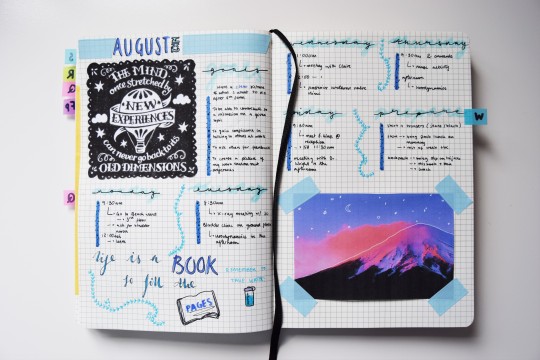
07.08.16// I’m going to be doing my work experience this week!! I’m really excited to finally be doing it, especially as I already know most of the staff XD
3K notes
·
View notes
Quote
1. Never leave cookies in the oven too long. Even if they’re still really soft, take them out after the recommended time. When they cool they will harden. Trust me, no one likes cookies that taste like rocks.
2. Always take a jacket. Even if you think you’ll be fine. Even if you’ll be inside. Even if there’s a heater. Bring your jacket.
3. Don’t be afraid to reach out and ask for help when you need it because everyone needs help sometimes.
4. The best pancake recipe is 1 cup equal parts flour and milk, ½ cup sugar and a pinch of baking powder. Add chocolate chips for extra deliciousness.
5. Go outside every day. Even if you don’t want to. Even if you have to use all your strength to drag yourself out of bed. The sunshine might not cure your problems, but it’ll do you so much good to breathe fresh air.
6. Don’t let your hobbies fade away. Keep reading, keep drawing, keep singing, keep painting, keep running. Keep doing what you love.
7. Carbs are not the enemy. They fuel your brain. So eat those potatoes and that rice and don’t you feel guilty about it for one second.
8. I know it sounds cliché but time really does heal all wounds. Give yourself 6 months and it won’t hurt so much, trust me.
9. Be kind. There is no reason for you to put someone down.
10. Learn to love yourself loudly and unconditionally and never apologise for it.
11. If you ever find yourself involved with someone who treats you like you’re nothing, run for the hills and never look back. They don’t deserve you.
12. Rose hip oil is a miracle worker. Gently rub over your face each night before bed and your skin will feel like silk.
13. Drink. Three. Litres. Of. Water. Every. Day.
14. Take pictures. Document everything. One day you’re gonna want to look back at all of this, make sure you have the photos to look at.
15. Let go of anything that weighs you down. The past is the past and there’s nothing we can do to change it. Every day is a another chance for us to do better, to be better.
16. Spend as much time as you can with the people who make you laugh.
17. Set up goals for yourself and keep yourself motivated in whatever you’re doing. Always have something to work towards.
18. Try to make your bed every morning. Yes it’s a hassle when you’re half asleep but there is no better feeling then coming home to a nice clean freshly made bed, especially if you’ve had a bad day.
19. Treat yourself but also look after yourself. Eat lots of fruits and veggies and move your body then dance all night and have a doughnut as a midnight snack. Life is about balance.
20. Never be afraid to love, even if you’ve been hurt before. Live life with an open heart and you might be vulnerable but you will experience so much joy.
words of advice from a 19 year old (via mangosandmulberries)
32K notes
·
View notes
Photo
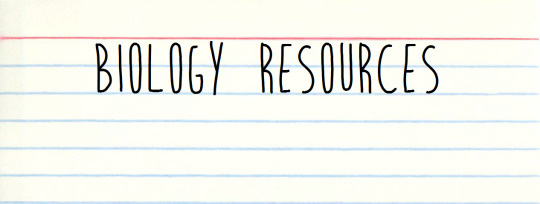
Disclaimer: These are online resources that I have found, They are not meant to be your only source of study, instead you can use them to your enhance your normal study. I don’t know what level these resources are aimed at, but I’ve tried to provide a range for a number of different topics.
The Body:
Teeth and Dentition
Take a look inside a cell (with some audio)
Explore human anatomy in 3D
Skeletal System
Muscular system
Cardiovascular system
Digestive system
Endocrine system
Nervous system
Immune/ Lymphatic system
Urinary system
Female reproductive system
Male reproductive system
What we didn’t know about penis anatomy - Ted Talks
Integumentary system
Sensory systems
3D Brain
Brain explorer program
How brains learn to see - Ted Talks
Body parts on a chip - Ted Talks
The real reason for brains - Ted Talks
A look inside the brain in real time - Ted Talks
Cells:
Amazing cells - inside a cell, how vesicles transport, communication during fight or flight, membranes.
Cell size and scale
The evolution of the cell
Interactive cell model
The inside story of cell communication
Stem cells - cell differentiation, stem cells in use, potential use, stem cell debate.
Cloning
Animals and Plants:
Interactive tree of life
Buds and Twigs (Background article: Buds and Twigs).
Seeds and Germination (Background article: Seed Structure).
Vegetative Reproduction (Background article: Vegetative Reproduction).
Vegetative Reproduction - Tropical Examples
Flower Structure
Flower Structure - Tropical Examples
The beautiful tricks of flowers - Ted Talks
Fruit Formation
Fruit Formation - Tropical Examples
Protista
Insect Life-Cycles
Insect - Tropical. The Citrus Swallowtail Butterfly, Papilio demodocus
Insects are awesome! - Ted talks
How a fly flies - Ted Talks
Fish: Characteristics
Fish: Tilapia
Amphibia
Birds
Fungi
6 ways mushrooms can save the world - Ted Talks
Animals that amaze - Ted Talks
Humble plants that hide surprising secrets - Ted Talks
Genetics:
Alien population games
Make a Karyotype (game)
Pigeon Breeding: Genetics At Work
The secret of the bat genome - Ted Talks
The hunt for “unexpected genetic heroes” -Ted Talks
What’s a Genome? - An informative overview of genomics presented by the Genome News Network. Topics include: What’s a Genome?, What’s Genome Sequencing? and What’s a Genome Map?
The Animated Genome - A 5 minute film about DNA.
Discovery of DNA - An interactive timeline of scientific discoveries
Heredity
Family Health History
Genetic Traits
Mendelian Inheritance
Mitochondrial Inheritance
Multifactorial Inheritance/Complex Disease
Sexual Heredity vs Asexual Heredity
RNA
Structure of the double helix
Chromosome Map 3D Animation - A 3D animation of a chromosome map
DNA Molecule - How DNA is Packaged - An animation of the packaging of DNA into chromosomes
Introduction to inherited traits
Chromosome and inheritance
Introduction to Medelian genetics
Introduction to pedigrees
Molecular genetics
What is DNA Replication?
Transcription (gene expression)
Translation
Replicating the Helix - A short animation of DNA replication
DNA Replication (Advanced Detail) - A detailed animation of DNA replication
X or Y: Does it make a difference?
Molecular basis of heredity, Nucleic Acids
Molecular basis of heredity, Genomes
Molecular basis of heredity, Genetic variation
Molecular basis of heredity, gene identification
The DNA Files - A series of 14 one-hour public radio documentaries and related information.
Understanding Gene Testing - An informative, illustrated tutorial on genes and genetic testing.
Epigenetics
Genetic science
Evolution:
Genetic Drift
Natural Selection
Origins of Genetic Variation
Health:
Genetic disorders
Pharmacogenomics
Family health history
Gene therapy
Fighting a contagious cancer - Ted Talks
Other:
Biology GCSE & IGCSE Question Bank
Can Bacteria Be Designed to Create Gasoline?
Model Earth (Ecology)
Extreme Environments: Great Salt Lake
Astrobiology
The Human Microbiome
The Science of Addiction: Genetics and the Brain
Virtual labs
Biology textbook
Biology Experiments
Where are the baby dinosaurs? - Ted Talks
Digging up dinosaurs - Ted Talks
100 Best (Free) Science Documentaries Online
More Biology documentaries and videos
Ocean wonders -Ted Talks
The sea we’ve hardly seen - Ted Talks
A census of the ocean - Ted Talks
Deep ocean mysteries and wonders - Ted Talks
The weird, wonderful world of bioluminescence - Ted Talks
Online Lessons and Guides:
Chemistry of life
Elements and atoms – elements and atoms, matter, elements and atoms, introduction to the atom, atomic number, atomic mass, and isotopes.
Electron shells and orbitals – orbitals, electronic configuration, valence electrons, groups of the periodic table, the periodic table, electron shells, and orbitals.
Chemical bonds and reactions – ionic, covalent and metallic bonds, electronegativity and bonding, intermolecular forces, chemical bonds, chemical reactions introduction and chemical reactions
Water, Acids and bases:
Hydrogen bonding in water – hydrogen bonding in water, hydrogen bonds in water, water as a solvent, solvent properties of water.
Cohesion And adhesion – capillary action and why we see a meniscus, surface tension, cohesion and adhesion in water
Temperature and state changes in water – LeBron asks why does sweating cool you down, evaporative cooling, heat of vaporisation of water and ethanol, specific heat of water, liquid water denser than ice, specific heat, heat of vaporisation, and density of water
Acids, bases and pH – autoionisation of water, Arrhenius definition of acids and bases, bronsted-Lowry definition of acits and bases, definition of pH, acids bases, pH and buffers
Cellular and molecular biology
Cells – diffusion and osmosis, nucleim membranes, ribosomes, eukaryotws and prokaryotes, endoplasmic reticulum and golgi bodies, chromosomes, chromatids, and chromatin.
Introduction to cell division - Fertilization terminology: gametes, zygotes, haploid and diploid, zygote differentiating into somatic and germ cells
Mitosis – interphase, mitosis, phases of mitosis, mitosis questions.
Meiosis – comparison of mitosis and meiosis, chromosomal crossover in meiosis 1, phases of meiosis 1, phases of meiosis 2.
Stem cells and cancer – embryonic stem cells, cancer.
Cellular respiration – ATP, ATP hydrolysis mechanism, introduction to cellular mechanism, oxidation and reduction review from biological point of view, oxidation and reduction in cellular respiration, glycolysis, krebs cycle, elctron transport chain, oxidative phosphorylation and chemiosmosis.
Photosynthesis – light reactions, photophosphorylation, calvin cycle, photorespiration, C-4 photosynthesis, cam plants
Human Biology:
Circulator and pulmonary systems – the lungs, red blood cells, circulatory system, haemoglobin.
The neuron and nervous system – neuron anatomy, sodium potassium pump, action potentials, salutatory conduction, neuronal synapses.
The kidney and nephron – kidney and nephonr, secondary active transport.
Muscles – myosin and actin, tropomyosin and troponin, role of sarcoplasmic reticulum in muscle cells, anatomy of skeletal muscle fibre.
Immunology – phagocytes, immune responses, b lymphocytes, antigen presenting cells and MHC II complexes, helper T cells, cytotoxic t cells and MHC I complexes, review of cells, inflammatory response.
Heredity and evolution
Evolution and natural selection – introduction, ape clarification, intelligent design and evolution, natural selection and the owl butterfly, variation in a spcies.
Heredity and genetics – introduction, Punnett squares, allele frequency, Hardy Weinberg equation, sex linked traits, DNA, RNA transcription and translation, alleles and genes.
Tree of life – taxonomy and the tree of life, species, bacteria, human prehistory
Crash Course
Biology and ecology – pollution, conservation, ecosystems, nitrogen cycle, history of life on earth, population growth.
(Spotlight Lessons): Ecology
Estimating Population Size – simulate mark and recapture by using small objects to trap and tag. A simple formula will tell you what the overall population size is which can be verified by counting the objects in the bag.
Owl Pellet Dissection – owl pellets are undigested bits of fur and bones that owls regurgitate. Students can examine the contents, reconstruct the skeleton of the prey and make inferences about the owl’s diet.
Interpreting Ecological Data – examine charts, data tables and graphs to answer questions about population size, growth, and carrying capacity.
Biome Project – as a group, investigate a biome and present to the class the main features, animal and plant species present and general climate.
Isopod Behavior Lab – collect isopods (pillbugs) and design a chamber to test their response to different environments, such as temperature, moisture, and substrate.
18K notes
·
View notes
Text
A Really Fucking Vulgar Guide to Not Losing Your Shit in College (Condensed Version)
Bitches love to put things into lists. Moreover, bitches love numbered shit. Here’s some numbered shit in list format to help you not suck in higher education. You’re welcome.
1. Go to class. Like 210% serious. I don’t give a shit if you’re a get by on nothing, A+ slacker. You’re fucking paying for this crap so you might as well get the services owed to you. Take your ass to class even if you zone out 99% of the time. You know 1% more than you did when you walked up in there. Congrats, asshole.
2. All that free time you have during your first week of classes? Make it your bitch. Don’t just print the goddamn syllabus and be like all done. No motherfucker. Take a good fucking look at that assignment list. What’s due next week? Yeah, do that shit now bc I know you don’t have anything else to do. Then when you’re coughing up a lung six weeks into the semester and don’t feel like getting your ass up to do that calculus homework, you’ll remember this week. You’ll remember that you’ve been a week ahead this whole damn semester. Pat yourself on the back, ass wipe.
3. Prepare yo self. No seriously. You got notes to print for class? Sure you could be like all those other bitches and just shove them into your backpack, or you could actually /prepare/ for class. I’m talking looking that shit over, identifying key concepts, getting a decent grasp of the material before your ass is even in class. You a STEM major? Yeah, make this kinda shit your life because now class is like one bomb ass group review session. Again, you’re welcome.
4. Snack like a motherfucker, but save that junk food shit for the weekends. From now on, you are a fucking health guru during the week or if you’re a slacker like me, at least on the days you have class. Fruits? Hell yeah. Pack some of those. Mind wandering in class? Snack on some apple slices. Can’t stay awake? Keep eating some almonds or some shit, but don’t be that bitch with the potato chips. Just don’t.
5. Read. Yeah, you heard me. Read and I’m not just talking assigned reading. I bet my left butt cheek that your campus library has /something/ of interest to you. Commuting and don’t want to drive out there? Library databases bro. We’re in the digital age, motherfucker. I’d bet my other butt cheek that the shit you want is in a nice little PDF somewhere. But na man, you thinking maybe you want to go into computer science? Check out computer science books and eat them up bro. You don’t like reading them? Probably not the field for you. You a biology major in your second year? Yeah dumbass. Time to break out the bio books and not the ones your professor is shoving in your face. Amaze your friends and teachers with your out of class knowledge. Be a fucking star.
57K notes
·
View notes
Photo
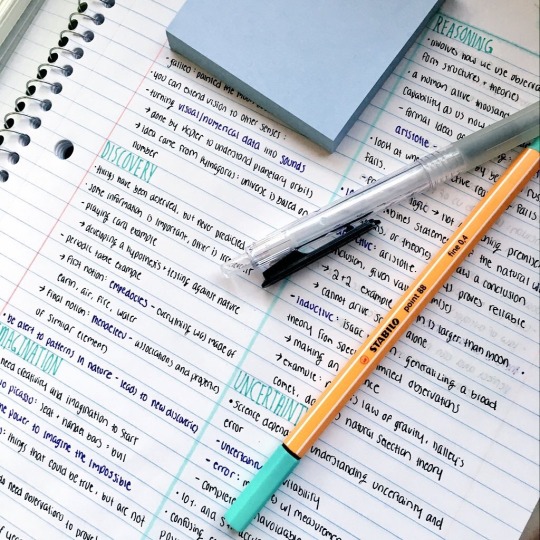
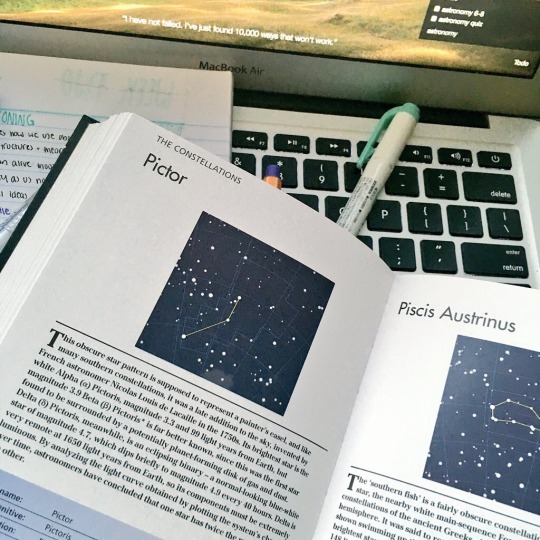
7.20 I’m like a day behind schedule for the online astronomy course I’m taking but it’s nothing I can’t handle:)) ft. a lil book “stars and planets: understanding the universe” that isn’t actually for this course but it’s ~aesthetic~ is gr8
12K notes
·
View notes
Photo
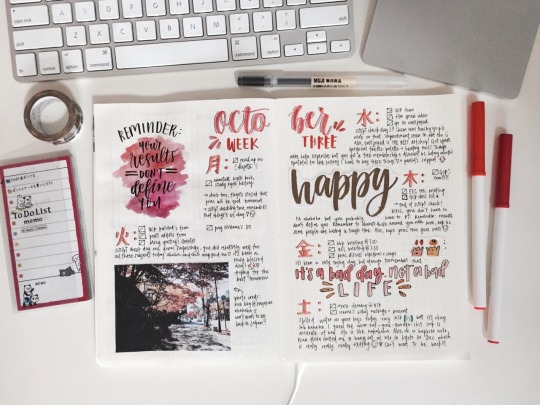
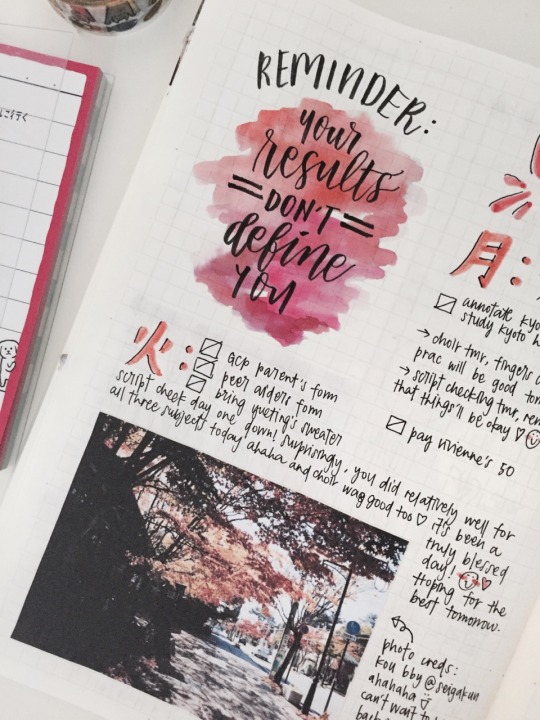
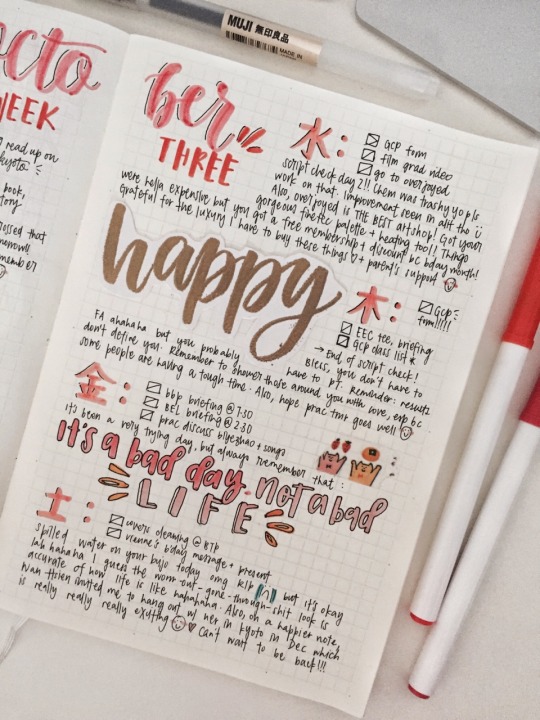
23.10.16
bujo spread this week was again inspired by the wonderful kOu & her amazing photos at @seigakun !!! photo credits to her ahaha (o^^o)
my exam results were released this week and I did…alright, I guess? but I think what’s more important to remember is that results do not define you, you are more than just your numbers.
on a separate note, I finally got my hands on the finetec palette and embossing materials this week asfjskDJAOMDK they’re amAZING (((o(*゚▽゚*)o))) I’m still pretty bad at using them bUT practice makes progress amirite ^o^
to see more of my artsy stuffsies – artgram
10K notes
·
View notes
Photo
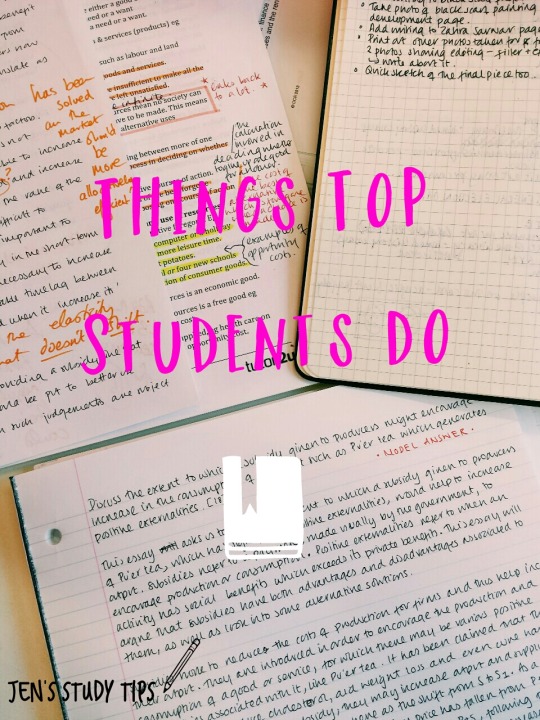
Things Top Students Do
1. They don’t always do all of their homework.
In college, homework assignments generally make up 5-20% of your grade, but can be the biggest time-suck for most students. Yes, working problems is one of the best ways to turn new concepts into working knowledge, but a large majority of those problems that take you hours and hours to work through, you’ll never see on an exam.
2. They never “read through” the textbook.
Per time spent, reading the textbook is one of the least effective methods for learning new material. Top students use the examples and practice problems, but otherwise use Google, lecture notes, and old exams for study materials.
3. They Google EVERYTHING.
It’s like an automatic reaction. New concept = go to Google for a quick explanation. Don’t think just because your professor gives you a textbook and some examples on the blackboard that you’re limited to that information. You have a massive free search engine at your fingertips, so make use of it.
4. They test themselves frequently.
Testing yourself strengthens your brain’s connections to new material, and gives you immediate and clear feedback on whether you know something or not. Bottom line, repeated self-testing significantly improves long-term retention of new material.
5. They study in short bursts, not long marathons.
Studying in short bursts tends to help you focus intensely because you know there is at least a short break coming.
This also fits in nicely with our Ultradian Rhythm, the natural activity/rest cycle of our bodies, which makes studying continuously for multiple hours on end counterproductive.
6. They reverse-engineer solved problems.
It’s one thing to follow and memorize a set of steps to solve a calculus problem. It’s an entirely different thing to understand what a derivative is, be able to take derivates of complex functions, know when to use the chain rule vs. the product rule, etc. The problem with simply following the steps the professor provided, or the textbook outlines, is that you’re only achieving a surface-level knowledge of the problem. Top students, instead,take solved problems and work backwards, from solution to question, asking “why.”
Why did this get this value?
Why did they simplify this expression?
Why did they use that type of derivative rule?
By following this process, you begin to understand the interconnections of the concept, and how to directly apply that to a problem. This “working knowledge” of a concept is key to performing well on exams, especially on problems that you haven’t seen before.
7. They don’t own a highlighter.
Highlighting anything = unengaged reading. If you want to note something that stands out, underline and write a corresponding note to go along with it. Or better yet, write yourself a note summarizing the item in your own words.
8. They sleep–a lot.
The daily routines of top performers, in any field, are characterized by periods of intense work (4-6 hours per day) followed by significant quantities of high-quality sleep (9 hours per night). You see this trend in top violin prodigies and chess champions, as well as elite athletes. The idea is to alternate periods of intense work with rest, so that you create tons of new connections in your nervous system, and then allow adequate time to assimilate those gains.
9. They engage themselves by asking questions.
What happens if I tell you, “Thomas Jefferson almost single-handedly drafted the Delcaration of Independence in 1776.”?
You might say “Hmm.. that’s interesting”, try to remember it for later, maybe even write down a note or two.
But what if I ask you, “Who was Thomas Jefferson?” What changes?
You start searching your memory, sifting through images of old guys, founding fathers, thinking about the Declaration of Independence. You come up with your own narrative, and then realize that you have gaps.
When was he around again?
And why was he so important?
You’ll probably find yourself going to Google to fill in the gaps. Through that process your learning will be much more deeply seated in your brain than anything your history teacher ever told you about him. That’s the power of asking questions.
10. They make the best out of lecture.
Yes, your professor sucks. Yes, lectures are boring. Yes, it’s either too fast so you can’t keep up and miss all the important stuff, or it’s way too slow and you start zoning out because you already understand everything.
The best students look at this this way: I’m going to be there no matter what, so what’s the best use of my time while I’m in the classroom? Ask questions, bring the textbook and look stuff up, focus on the important practice problems to copy down in your notes, try to anticipate what the professor is going to say, make note of anything they put emphasis on as a potential exam topic. All of these things make the time you have to spend in lecture more productive and engaging. And that’s less time you have to spend studying later on.
11. They over-learn.
School is hard enough, with the amount of studying and homework you have to do. And on top of all of that Facebooking you have to get done? It might seem ridiculous to suggest learning more than you have to.
What!? Are you insane!?
But this is precisely what top students do. And paradoxically, they end up spending less time trying to understand how to do homework problems, andless time studying for exams because of it. Because when you “over-learn” past what’s presented in class, you build a better framework for the subject.
Think of trying to remember some details about Abraham Lincoln’s life. You try to remember the dates of the Civil War, or what he said in the Emancipation Proclamation. You study the same facts over and over and over again… but it’s just boring, and you quickly forget. But what if you knew his whole life’s story? About how Lincoln suffered from bouts of depression, and his relationship with his wife suffered? You start to learn that the dude was human, and you start to relate to the things he did and the struggles he went through. Now you’ve constructed a story in your head. And studies show that humans learn best through stories. So yes, it’s more information, but your brain knows what to do with it now that all those random facts are linked together. More learning, but less rote memorization and struggling to remember random facts.
12. They immediately study their exam mistakes.
Most students get their exam grade back, flip through to see if the professor made any mistakes they can argue about, and then promptly shove it into their notebook, never to be seen again until the mad scramble at the end of the semester to study for the final.
Instead, top students ignore what they got right, and use their mistakes as an indicator of what to improve on.
13. They’re busy with work and side projects.
Yes, to do well in a course, you need to focus and put in the hours. But like many geniuses throughout history have shown, involvement in a diverse set of subjects, activities, and skill sets keeps you active, and provides you with a rich and diverse set of mental models to pull from.
Also, as they say, “If you need to get something done, give it to the busy person.” If you stay active in multiple areas, you don’t have time to procrastinate, and are forced to be efficient with your study time. This generally translates into quicker learning and better performance throughout the semester.
14. They use lecture as a detective mission.
Though completely unaware of this fact, your professor has tells. Yes, like in poker. Tells during lecture will hint at particular types of concepts and problems that will be emphasized on the midterm or final exam. The best students pay attention to topics professors spend a seemingly inordinate amount of time on and make note. Chances are you’ll see something related on the final.
15. They don’t wait for motivation to strike.
Motivation comes and goes, but studying for a degree requires persistence and consistency. Just like Olympic athletes train even on their worst days, the best students figure out how to get their coursework done when it’s the last thing they want to do.
16. They practice under test conditions.
The old adage “practice makes perfect” isn’t totally true. Deliberate practice under the right conditions, with the correct mindset, is more like it. Instead of reading through all of the lecture notes and redoing old homework problems, top students make themselves practice exams, and rehearse their exam performance, under time pressure and in similar conditions (no notes, uncomfortable chair, quiet room, etc.) to what they’ll see on test day.
17. They use old exams.
Professors aren’t the most inventive folk. Along with coming up with lecture material and departmental responsibilities, they’re also primarily concerned with research. So typically midterms and final exams more or less look alike for similar courses year-to-year and even across universities. Because of this, old exams are a gold mine of opportunity for figuring out what problems you should be able to solve and study from.
18. They make their own study guides.
The best students don’t simply use the study guide the teacher provides, they create their own.
Creating the study guide is half the battle, requiring you to go through your notes, consolidate them, and organize them in a way that you understand–all valuable study activities. You’ll also be able to use your equations sheet much more effectively on the exam itself (if allowed) because you know exactly where everything is.
19. They actually write on paper.
Writing out notes on a laptop is efficient. Too efficient. Because it’s so easy to quickly type out exactly what the professor is saying, you don’t have to do the work of trying to figure out how to consolidate the information into your own shorthand. Some also believe that the act of writing helps retain more information.
20. They use the 80/20 rule.
Yes, some students who get good grades do every reading assignment, finish every practice problem, and attend every study session they can get their hands on. But these students are missing the point. There will always be an endless amount of information you could learn given the time and effort, but having the ability to discern what is worth learning will truly set you apart.
Top students identify the 20% of concepts they need to learn deeply, in order to determine 80% of their final grade. They focus intently on those few things, and simply ignore the rest. This is a formula for high performance, without hours and hours of busywork. And it translates seamlessly into the real world too.
21. They don’t complain.
Complaining simply has no place in the smart student’s repertoire. If something sucks, change it or ignore it, but don’t waste your time, energy, and mental state talking about it. Got a crappy professor? Either switch class sections or focus on teaching yourself. Horrible textbook? Find alternate resources (Google is free in case you hadn’t heard).
22. They learn by doing.
Any technical subject can only truly be internalized through use. Just like learning a new language, learning to be fluent in algebra or calculus requires active application of rules and formulas. Top students know there is a big difference between knowledge, and applied knowledge.
23. They take personal responsibility for learning the material.
The best students understand that they, and only they are truly responsible for their own education. So waiting to be spoon-fed by your professor and doing the homework assignments will never be enough. Despite your school’s best intentions, they’ll never be as committed to your academic success as you can be.
24. Following what they love
Those students you admire are passionate about what they are learning. They have the drive to develop their learning further based on their love of what they are discovering. This may not always be the case and is often unavoidable but if you follow what interests you and cultivate a curiosity of this area, your motivation to learn will thrive.
Not every student is the same and many top students don’t follow the status quo. The best way to create good habits for students is to try a variety of techniques and figure out what works for you.
25. Question your teachers
Thinking outside the box is a cliche but certainly a reality for students. They question everything–especially test questions they get wrong. This attitude is important because it shows a general inquisitiveness that is essential in learning. As any parent of small children knows, questions are a way to gain knowledge. Teachers can’t be offended when a student asks a difficult question and parents should encourage this behavior.
26. They know the best way to study.
It is important to know the best way to study for yourself. Do you need pictures? Sounds? Study better in quiet or noisy environments? Figure out what works best for you so that you can make the most out of your study time.
27. They play hard.
We all know that a balanced lifestyle is the best way to stay mentally and physically healthy! Top students don’t spend all day in the library grafting (contrary to what you might think!) Rather, they take the time to put their studies aside and do something which is fun and exciting!
Source : 1 2 3 4
53K notes
·
View notes
Photo

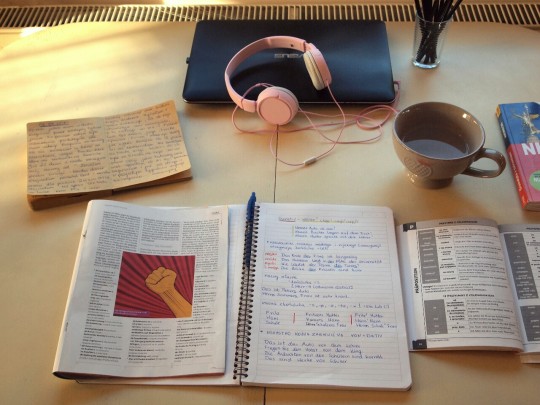
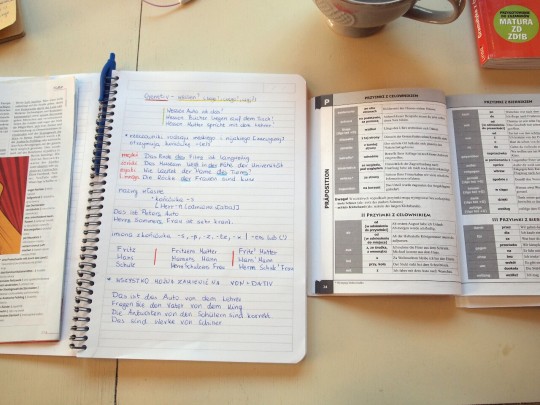
I finally feel like I’m making progress in German. I’m stuck between A2/B1. My goal is to get near B2 by the end of this year. I think I can do this. I honestly love the fact that you can improve your language skills just by watching YouTube videos xd Have a nice day everyone xoxo
5K notes
·
View notes
Text
How to Annotate Literature
Many times language and literature classes require students to annotate the books that are given to them, but in many cases tips and advice on how to do so is lacking. I will be sharing my personal strategy for efficient and successful annotating that will not only help your understanding of the text but also gain the love of your teachers!
The tips have been divided into 5 components, each with their own explanation.
Sticky Tabs are Your Best Friend
I don’t know how I would manage to annotate without my sticky tabs. They help me organize and navigate the book before the reading, remind me what to look for while i’m going through the text and help me find whatever I may need once I get to further analysis for the class.
Create a key for your tabs, personally I use five colors each having a few specific purposes based on where I place them in the book. Most stickies are accompanied by a specific note that will remind me of what I wanted to point out, these stick out of the right margin.
Pink- Anything to do with characters, be it development or certain traits to remember. It can also be used for when you have questions about character related aspects of the text.
Orange- Refers to setting, in plays it is also applicable for stage directions.
Yellow- Is used for literary devices and use of language (tone, diction, patterns) and syntax, if there is a particular word the author used or a structure you want to take note of, this is the color to use.
Green- Applicable to any important plot events, notable scenes or things that you think will be significant later in the story.
Blue- Themes and context of said ideas, anything to do with time, place and space in which the text takes place. It can also relate to how your context (a student reading a book for a literature course) impacts your perception of the text.
These are the things teachers usually look out for and it is certainly useful in any kind of further task!
The top and bottom margins can be used to divide the book in to sections, such as chapters or scenes, mark the most important pages and to also highlight text to text connections. These colors you can pick yourself!
I do not recommend having more than 5 sticky tabs per page, otherwise it gets too crowded and they lose their purpose! (but you will still need to buy aaa lloootttt)

This is my key for the book I am currently annotating, Pygmalion by George Bernard Shaw.
Don’t Overdo it With the Highlighter
Find one color highlighter that you like the most and use it to mark explicit words or phrases that catch your attention, you can also use them in correlation with you sticky tabs!
I prefer to use a yellow highlighter because it seems to bleed the least, and I usually use it in relation to the the yellow and blue tabs because those are the ones that relate to the most detailed and minute parts of the text. Once again you can find your own preference! But don’t overdo it, otherwise, like the tabs, the highlighter will lose its function to highlight important points.

This is an example of how much highlighting I usually do. For non-fictional texts or parts of a book (like in the introduction you see here) I reserved highlighter for dates and names.
Have a Conversation With the Author
This is one of the first tips that my high school teacher gave me and it’s really one of the most important ones to remember. And I know, it may sound kinda silly, but I find that it really helps me in developing my ideas and remembering exactly how I felt about a certain aspect of part of the text.
Whether the text is fiction of non fiction, anything in between, you can always do these few things
Ask questions- As if you were going to get an answer, ask questions, write them down and write down as many as you want. Writing things down helps people remember so then it is more likely that in a class discussion you will be able to recall your queries or wonders.
If you don’t like something, or you’re surprised by something, write it down! Use exclamation marks, use words that you would use in a regular conversation. I always write ‘WOW!!’ or ‘OMG’ when i’m especially impressed, and having such vocal- well written vocally- emotions will bring you closer to the subject of the text.
Talk to the characters as well, if you are questioning a character’s actions ask them and provide an explanation as to why you speculate they may have acted a certain way. Not only does that further contribute to your involvement (also making things more entertaining) but it also deepens your thought!
What i’m trying to say is write down anything that comes to mind, your first response is your true response, and it is a valuable addition to your notes! And if you want to write a whole essay in between the lines… Actually, i’ll come back to that later!
Pens, not Pencils
I used to make notes completely in pencil but my approach changed when I realized that overtime the pencil would rub off and get illegible. I think it was because I used my book so much, but having switched to pen I realized that it helps me in quite a few other things as well.
The good thing about pen is that you can’t erase it and let’s say you started writing down a note, scan down the page and realize what you are taking a note of is completely wrong. That’s ok! That’s actually really good! Don’t scribble out what you just wrote down, but instead continue and explain why you may have thought a certain way and what your understanding is now. That relates really closely to the previous note.
Evidently pen also appears darker on the page, then there’s no possibility of it ever disappearing. It also won’t smudge or bleed as long as it’s ballpoint! That’s a good thing when drawing arrows between lines, underlining in addition to your highlights and circling/boxing whatever you deem necessary.
Time, Effort and Commitment
It’s clear that this post took me a while to make, and it took me a while to develop this system with all of the things that I have considered. So it must be self evident that using this type of annotation won’t be quick. It might get tiring at some times, and for me it really does, but at the end I find that it always pays off! You have to stay committed to this technique, you have to put in the same amount of effort for every page, which means you need time. So here are a few final general tips I will leave you with.
Don’t procrastinate! As goes for any task, and this one more than any, don’t waste time getting to it! I advice you check how many pages you have in total and make sure that you do a certain amount per day (usually 5-10 pages a day is good!)
If you go off on massive tangents in the side bars, make sure that you don’t get too distracted by them because they will take up a lot of your time. But one now and then may be good! Be sure to mark it for later reference!
Play mind games with yourself. This one is actually pretty interesting but it personally gets me a long way. If you have 20 pages left, don’t look at it as 20 pages but instead as 4 times 5, then the amount will seem a lot more manageable! It’s a kind of self encouragement!
That can also be said by looking now and then at how far your bookmark has moved through the book and giving yourself a pat on the back for all of you hard work!
That’s all I have for now! If you have any further questions for advice or explanation please message me and I will be more than happy to help! And I hope that this helps some people out too! (I’m counting this as 21/100 days of productivity as all I did today was related to annotating.)
7K notes
·
View notes
Photo
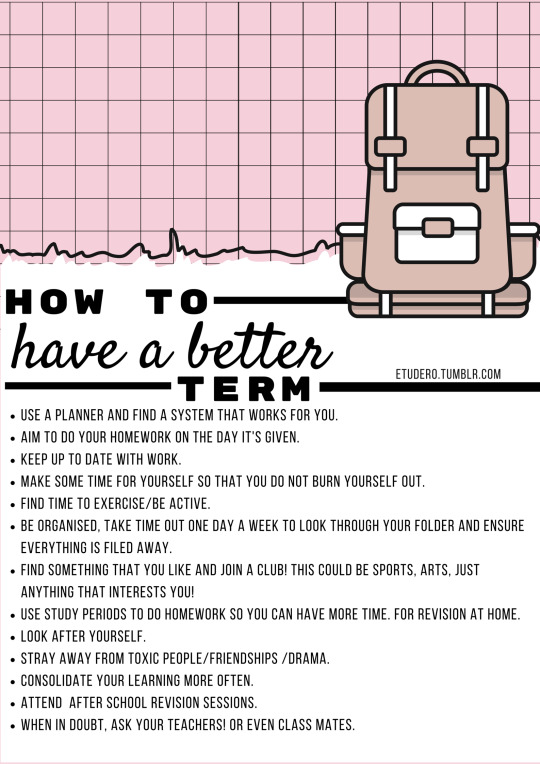
“Always and never are two words you should always remember never to use.”- Wendell Johnson
With the half term in full swing, I took some time to sit down and note what I could do different the next term. After racking my brains, this is what I came up with. These are all the things that I’m going to try in fact, things that I’m going to do next term.I might even print it out and stick it on my wall so that I remember to do it!
Anyway, remember to do work over the half term however also to take a well earned break because this is what half terms are for. It’s for you to take a break and recharge your batteries so that you can karate chop the next term!
Honestly, sometimes I wonder why I say things like “karate chop”? T_T
6K notes
·
View notes
Text
Please check out
https://www.etsy.com/uk/shop/thekawaiipalace
For amazingly cute stationery!
0 notes
Photo
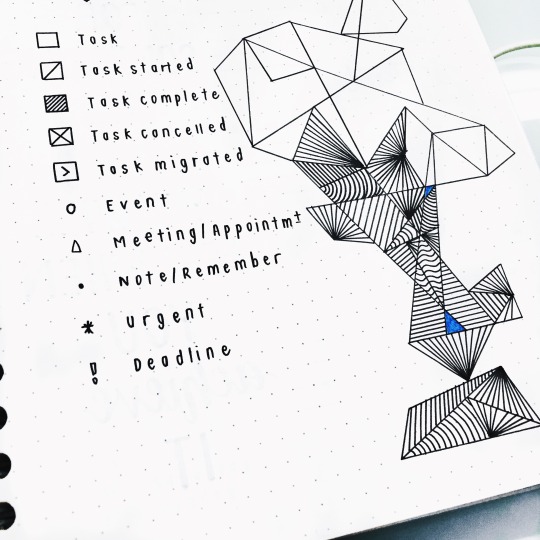
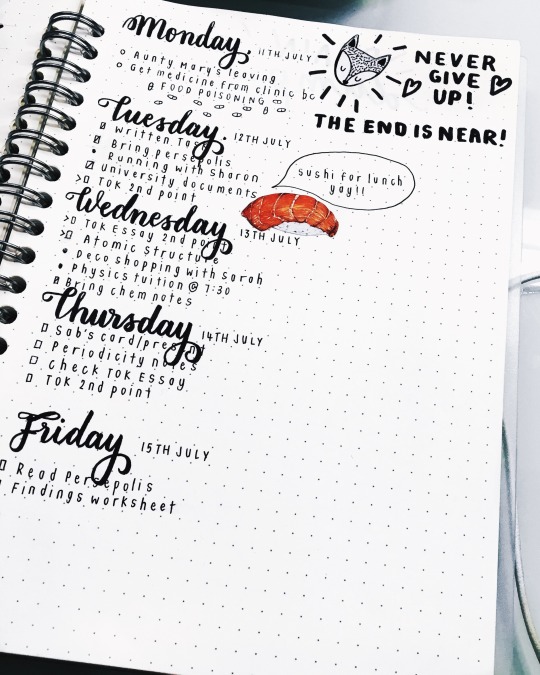
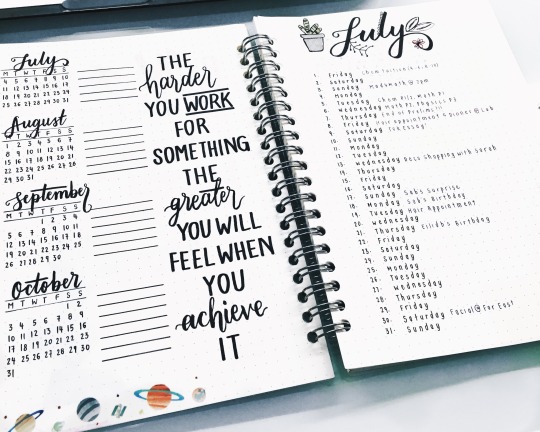
Been crazy busy with school but here are some pages from my first ever bullet journal!! ✨
15K notes
·
View notes
Text
Memory Tips and Techniques:
Know your personal learning style. The techniques which are appropriate for you will vary according to your learning style.
Sensory or visual learners normally have a preference for practical approaches involving the use of images.
Active learners tend to prefer to learn by physical activity such as manipulating materials.
Reflective learners prefer theoretical and analytical approaches to derive meaning.
Verbal learners opt for word based tactics.
Creating lists: this is the most basic technique. Distill your notes into a series of headings. Ding this helps imprint the knowledge and the end result is an overview of the subject allowing you to place your knowledge in the right context. This is suited to verbal or read-write learners. Numbering your lists can be useful for memory.
Making timelines: You can use timelines to plot the progress of events, procedures, or developments. These can be drawn as vertical or horizontal. They are particularly useful if a lecture has referred to a set of events.
Sketching Mindmaps: These are extremely visual and rely on their colour and shape to produce a memorable and attractive image. Some people use these in lectures or classes. For revision, they should be quick, legible and coherent. Concept maps can be as useful as outlining answers.
Drawing Diagrams: Diagrams can be used to show hierarchies, processes, or relationships. They can be used to build an answer outline. Sometimes they can even form a part of your formal answer. They are extremely useful to visual learners. However, take care when they are personal and only have meaning to you because they may not add value to any content in exams.
Posters and Post it notes: This is good for people who like to subliminally absorb information. It suits kinesthetic learners. The idea is to create an area full of posters to help embed the information into your memory a a part of your normal everyday world.
Use nonsense words and mnemonics: I will always remember the colours of the visual spectrum through Richard Of York Gave Battle In Vain.
Use rhymes: We all know how memorable music is and how much it gets stuck in our heads. Use it. Create your own lyrics for a tune you know, or adapt rhymes that you’ve known since childhood. Nursery rhymes are really great for this.
Journey pegs: Think of a long journey with which you’re familiar. Identity stages on the journey that you are able to remember. Map the facts onto thee stages by “pegging” a memory to that place through relation.
Create a story: Especially useful if the story is funny.
Listing: Knowing how many points there are meant to be can hep you work out if you’ve forgotten something.
Practice: Keep going over the material.
Revisit your notes with memory techniques in mind.
Encoding:Think about how you normally remember thins; acoustically, semantically (meaning) or visually? Use it. Use rehearsal out loud for acoustic encoding of memory. Question the material and it’s meaning for semantic encoding. Look at the material and note it’s key visual features for visual encoding.
Chunking: Chunk the information (break it up into smaller and more manageable pieces).
4K notes
·
View notes
Photo
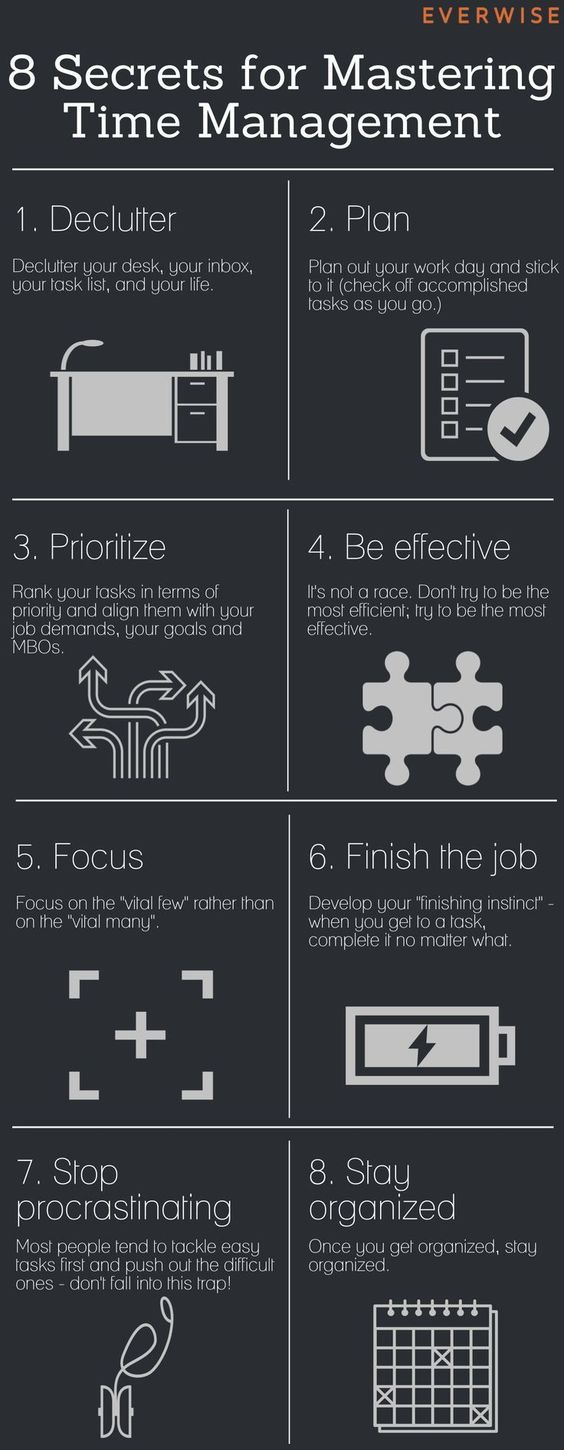
If you like more useful content such as life hacks or DIY’s follow me @forwardstyling.
31K notes
·
View notes
Text
how i spent only $34 to purchase $1,000+ worth of school supplies for college
One thing I’ve found that many college freshmen do is they purchase everything at the school bookstore, shelling out more than $800 for what they think is the cheapest deal possible. Let me tell you now, that you’re doin’ it wrong if you think paying hundreds of dollars is the best you can do.
To put it into perspective, for this past year, if I purchased all of my required textbooks from my school book store I would have had to pay $1,466 (tax not included)–and this is the total calculated if I bought used textbooks only. If I wanted brand new textbooks, it would have been over $2,000 (tax not included). In the end, I only spent $34 to purchase an entire year’s worth of supplies (that’s a 97% discount!!!), and I will tell you how. Of course, how low you can go will depend on the type of textbooks your professors require you to have and if you need any online access codes.
1. Email your professors
A lot of professors receive compensation from publishing companies to include their books in the curriculum, so many professors will say a book is required when in reality, you probably read 4 paragraphs from that text in the course of a semester. Always e-mail your professors beforehand about the list of required texts and other required items so see how many times you really need that book or item.
For example, at the beginning of fall semester last year, one of the required items listed for lab was lab cartridges which cost $88. Before making the decision on whether to purchase that or not, I e-mailed the lab coordinator and asked about what the cartridges were, which labs they corresponded to, and how often we would need to use them. The response? We didn’t need them at all for lab. If I didn’t ask my professor about it beforehand, I could have potentially paid $88 for something I didn’t need.
2. Join your school’s Facebook network.
Most, if not all, colleges will have a network on Facebook. Whenever you get your admission e-mail, or in your school’s portal, there should be a link to join the main Facebook group. Through there, once you’re accepted, you should be able to access many other Facebook groups within the school network. Many colleges will have a group dedicated to students who are selling their old stuff, and many will sell their textbooks on there as well.
Freshman year, I paid $150 for my general chemistry textbook, the solutions manual to the chemistry textbook, general biology textbook, lab manual, lab goggles, and clicker by purchasing them from a student who took those courses already and had no use for them anymore. To put into perspective how much I saved, the general biology textbook itself retailed for $150 in the campus bookstore; and the total amount I would have had to pay if I purchased all those books from the bookstore would have been more than $560. I basically purchased this at a 75% discount!
I would consider that purchasing from students at your university is generally a safe transaction, as most people meet up on campus to exchange the cash for the product, but remember to always exercise caution. You can always ask the seller to send you more detailed pictures if you want to know more about the condition of the item, and most of the time, you can also try to haggle the price of the item down.
3. Try to find online PDFs
One of the biggest reasons why I was able to save so much money this year with my textbooks was because of online PDFs (bless those uploaders). I was able to download my organic chemistry textbook and solutions manual, and molecular cell biology textbook online for free. If I had to purchase them from the campus bookstore, I would have had to pay $917. That’s a lot of money I saved!
Generally speaking, textbook versions don’t really vary much. For the organic chemistry PDF I mentioned, I actually found the previous edition of the one we were required to have for the course. I e-mailed my professor and asked if there was any particular difference between the 3rd and 4th edition, and he responded saying that other than the fact that some content in one chapter was moved to the next, there was no difference, and there really wasn’t. Even the chapter problems were the exact same.
If you’re the style that likes to have a paper copy in their hands, you can always print out the PDFs.
4. Share with friends
As a biology major, we have many labs, and for those labs, we’re required to purchase a lab manual. This past year, I took orgo lab, and the lab manual for that was $143. I couldn’t find this online as a PDF because A) it was the newest edition for this year, and B) it was written by our lab coordinator so it couldn’t be found anywhere else. So I chose option C instead: share with a friend. One of my friends compared the previous year’s edition with the edition we were required to have to see if there were any big differences (such as different experiments), and there weren’t really, so she purchased last year’s lab manual from an upperclassman for $25 (I paid $12 since we were sharing). Since we had lab on different days, we were able to share the manual.
I also made scans of the manual as well so I wouldn’t hog it when she needed it to complete her conclusions, and she could use the scans for her pre-lab while I was using it to write my conclusions.
5. Don’t buy, rent instead
If you absolutely have to have a book and you can’t find it online as a PDF, see if you can rent it instead. Although your campus bookstore will also have rental prices, 3rd party rental prices are almost always cheaper. Two sites I highly recommend are Chegg and Bookbyte. Although I haven’t used Chegg personally, many of my friends do and they say Chegg’s prices are lower. I’ve personally used Bookbyte, and although their selection is a tad smaller than Chegg, they have great customer service. In addition, if you need your rental for a couple days past the rental date, you can send it back late (up to 12 days I believe) without being charged any additional fees or paying for an extension.
For example, if I were to rent the anthropology textbook from my bookstore would have costed $40, and renting from Amazon would have cost $35, however, Bookbyte had my anthropology textbook listed for $12 to rent. They actually sent me 2 copies of it (I was only charged for one), and both were in excellent condition. When the time comes for you to return your textbooks, just print out the pre-paid shipping label Bookbyte sends you and you can ship the book from your campus mailroom.
6. Ask upperclassmen
Second semester this year, I was able to get my hands on a hard copy of the newest edition of the orgo textbook and solutions manual for free, because one of my upperclassmen friends passed it down to me without asking me to pay, so she’s basically the nicest person ever. You can always ask upperclassmen friends first for textbooks and such if they’re the same major as you because chances are, they’ll still have their old textbooks and would most likely be much more willing to help out a friend than a student they don’t know.
7. DON’T BUY “USED” ONLINE ACCESS CODES
The only thing you cannot get a discount on are online access codes. Any sites that are selling “used” online access codes are fake, and you should not purchase from them. Online access codes are associated with specific professors and courses, and e-mails as well. In addition, most have a set expiration date (usually a year or a semester), so any “used” online access code will most likely have expired by the time you try to use it.
What I usually do if I have to have an online code is accept their free trial. Companies such as McGraw Hill’s Connect have a 2 week free trial, and since my professors put up all the assignments in advance, I complete all the assignments within the free trial period. When the free trial expires, I can’t access the module again unless I pay, but the records of me completing my assignment still exist and I still get my homework points. I was lucky enough that our professor assigned online HW as easy gimme points, so I didn’t have to wait until he taught the material to finish it. The only online homework I paid for was Sapling, which was $10 since the free trial was only 6 days and homework assignments were uploaded weekly.
6K notes
·
View notes
